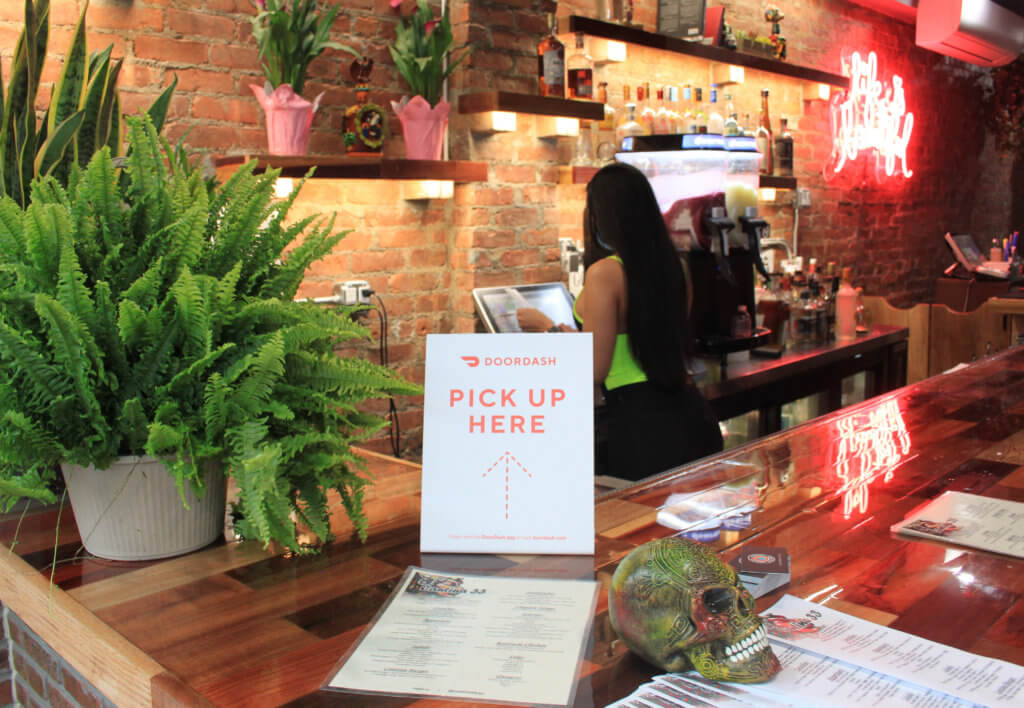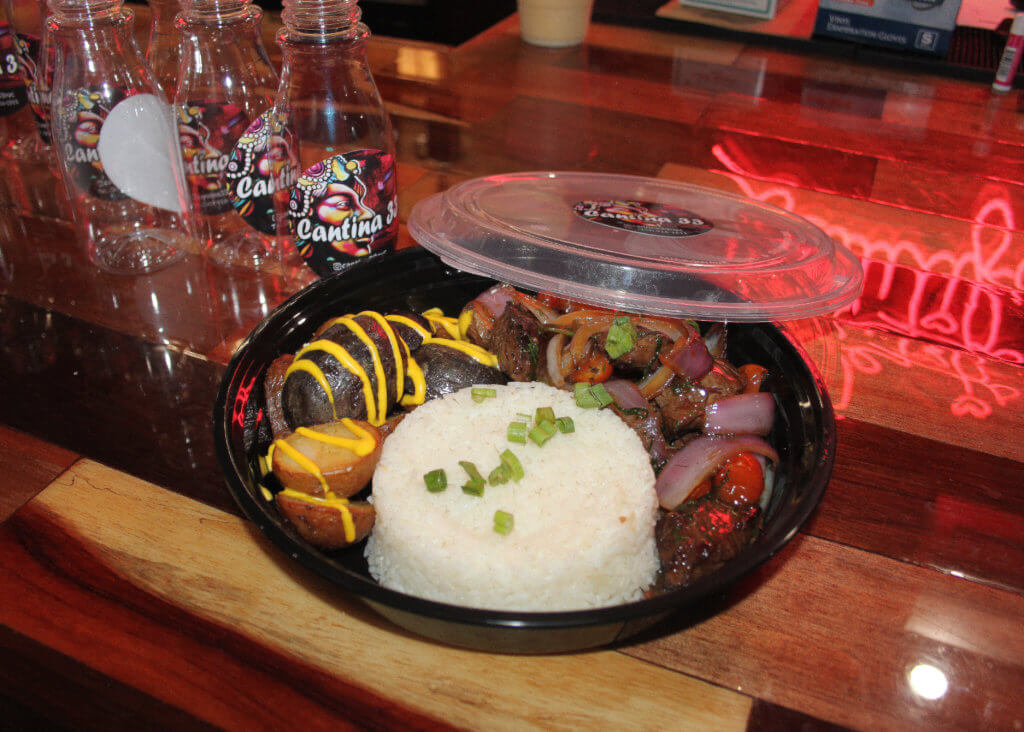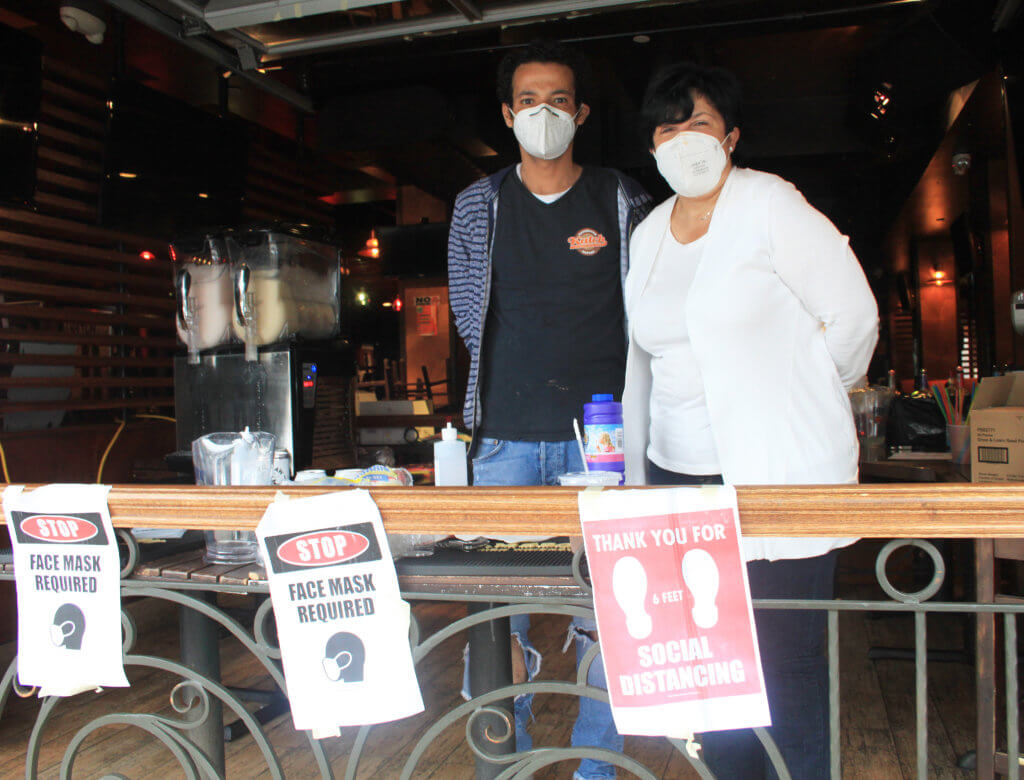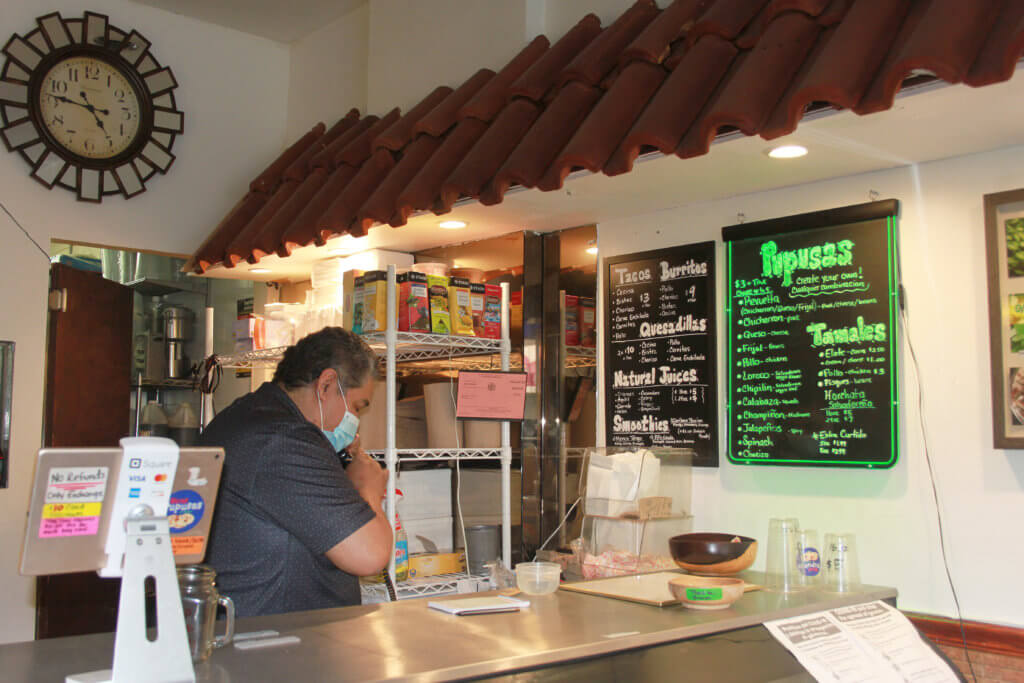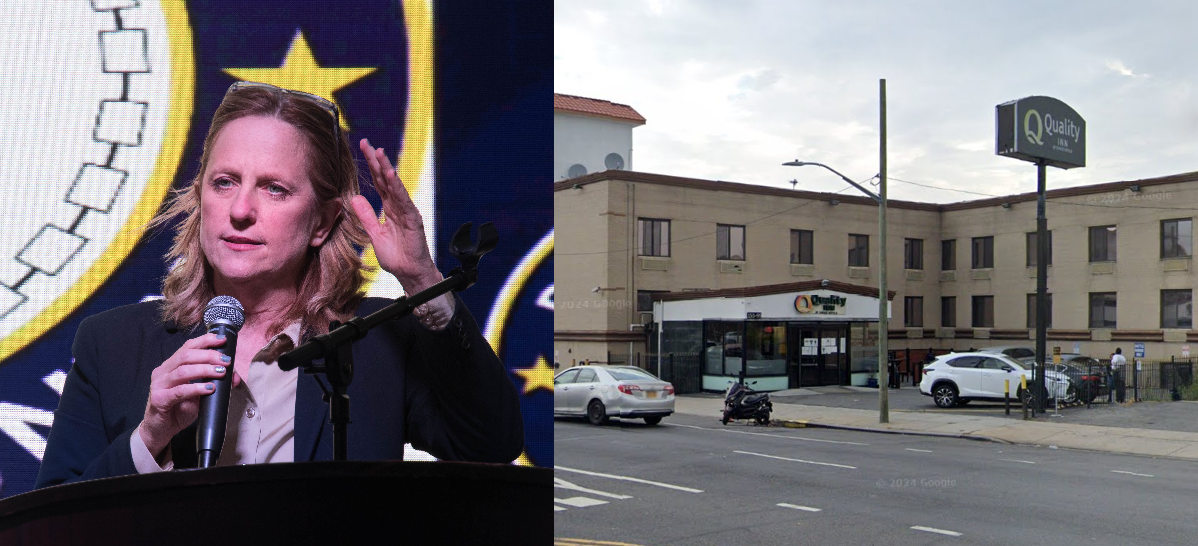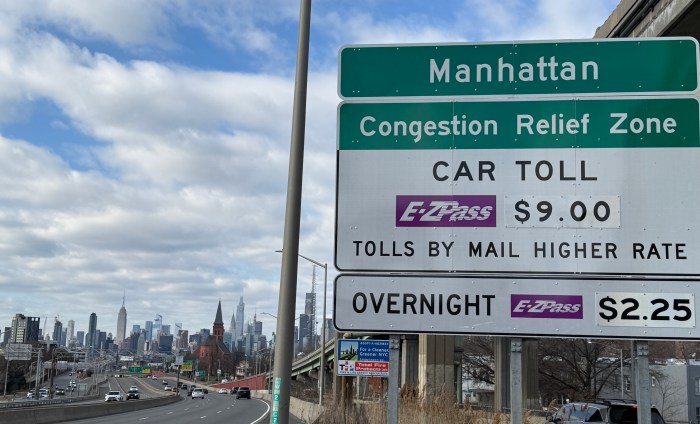Cantina 33, a brand new Peruvian restaurant at 55-33 Myrtle Ave. in Ridgewood, was only open for two months before they had to temporarily close due to New York state’s stay-at-home order.
“I honestly thought it was going to last like two weeks,” said Chef Kevin Lenis, owner of Cantina 33. “I didn’t think it would be this long. But it’s been two months, and I had to make changes because, at the end of the day, I still have rent to pay.”
Lenis wanted to wait until it was safe to open back up to inside dining, as he felt his food — beautifully crafted, traditional Peruvian dishes with a modern twist — was meant to be enjoyed inside the vibrant and sleek ambiance he created.
But as time went on, the 28-year-old business owner from Jackson Heights realized there was no specific end date in sight. He also thought about his team of about 15 people, who wanted to come back to work. So on May 15, he began offering deliveries and adjusted the menu by adding more options, including Peruvian sandwiches inspired by his go-to, after-work snack he used to get from a small food truck in Peru.
As New York’s COVID-19 numbers decrease and the city and state begins to reopen, Lenis isn’t sure that some of the restrictions that have been mentioned would allow his restaurant, with 42 seats, to not only survive, but also thrive.
“I don’t know if all restaurants will be able to bounce back from this,” Lenis said. “Yes, you need profit … but we put a lot of passion and love into what we do. And that’s what pushes us to keep going everyday.”
Like Cantina 33, restaurants and bars across the city struggled to figure out what to do once Gov. Andrew Cuomo passed the stay-at-home executive order in March. Many settled for delivery and take-out, some temporarily closed, and others have shut their doors permanently. But as stay-at-home orders continued to get extended for two more weeks — which became a month, then two months — independent restaurants and bar owners began to fear for their businesses’ survival.
Back in March, Queens Chamber of Commerce President and CEO Tom Grech said “at least 50 percent of restaurants” that closed in Queens due to the pandemic probably won’t reopen.
“That’s a terrible thing for livelihood … terrible thing for Queens,” he said during a virtual town hall.
Even now, restaurant and bar owners are taking it day-by-day, uncertain of their future. But more and more are speaking out and calling for officials to come up with a concrete plan with guidelines that will let them reopen sooner rather than later. Or allow them do it themselves.
Planning ahead
A few weeks ago, Mayor Bill de Blasio mentioned limiting capacity inside restaurants and bars.
Roseann McSorley, the co-owner of Katch Astoria, a popular gastropub at 31-19 Newtown Ave. that reopened for take-out and curbside margarita pick-ups in May, said limiting their capacity won’t help.
“We’ve told [Senator Michael Gianaris] and a lot of our local politicians that 30 percent is not going to help us open. We need at least 50 percent occupancy,” McSorley said, adding that Katch has 150 seats. “If you tell me that I can only get 30 percent, that’s a very small number and we’ll never be able to make it.”
She added that capacity limits may also affect how many people she’ll be able to employ (she had about 40 staff members, most of whom are collecting unemployment). And as major sports prepare to come back, McSorley said people will want to watch them at places like Katch, where they pay thousands of dollars a month for cable.
McSorley already came up with a guide to reopen. They’re going to take temperatures of both staff and customers who will need to use face masks, have dining tables six feet apart separated by plexiglass, give customers Ziploc bags to store their masks when they’re eating and drinking, use a phone app so they won’t need to use physical menus, and have a cleaning company do a deep clean once a week while they disinfect everyday.
McSorley runs Senator Gianaris’ western Queens business committee, and said businesses in the community are looking to buy supplies like masks, face shields, hand sanitizer and gloves in bulk to distribute among each other.
“We don’t see each other as competition anymore. We’re all affected by the same things,” she said.
James O’Reilly, owner of Yerman’s Irish Pub at 7026 88th St. in Glendale, took to Facebook on May 28 to showcase his opening model.
“It looks like they have no guidelines or model for places to maximize customers,” O’Reilly said in the video. “Well I came up with a model, call this O’Reilly’s Law.”
O’Reilly showed off the adjustable separators made of wood and plastic glass that they created to place in between customers at the bar, with Marine plastic placed in front of the bar. He also has mobile separators to put in between booths. His restaurant has almost 300 seats, which he said allows him to safely use the inside.
O’Reilly, a 59-year-old Irish immigrant, has been in the restaurant business in Queens for almost 20 years. His staff of 10, including his two daughters and in-laws, say they want to go back to work. He said they’ve all had antibody tests that came back positive, so they’re not worried about contracting the virus, if the antibodies suggest they already had it.
“You can go to Home Depot, Walmart, BJ’s … where people are standing shoulder to shoulder, and we can’t open?” he told QNS. “It’s unfair.”
Reopening carefully
Even so, restaurant owners want to be careful about how and when they reopen.
The Lowery Bar and Kitchen at 43-02 43rd Ave. in Sunnyside came back for pick-up after receiving calls from community members who missed them. Anne Muldoon, an Irish immigrant who opened up the restaurant about four years ago, said that after deep cleaning the restaurant, she decided to reopen at the end of April with a smaller menu.
“We have a lot of love for this neighborhood,” Muldoon said. “It’s not really about making lots of money or making a profit right now. It’s about survival, and about putting food on my staff’s tables.”
Muldoon is deeply mindful of cleanliness and social distance precautions. She said her staff is bleaching her sidewalks every night, windows are cleaned, and her cooks wear masks and gloves that they change periodically.
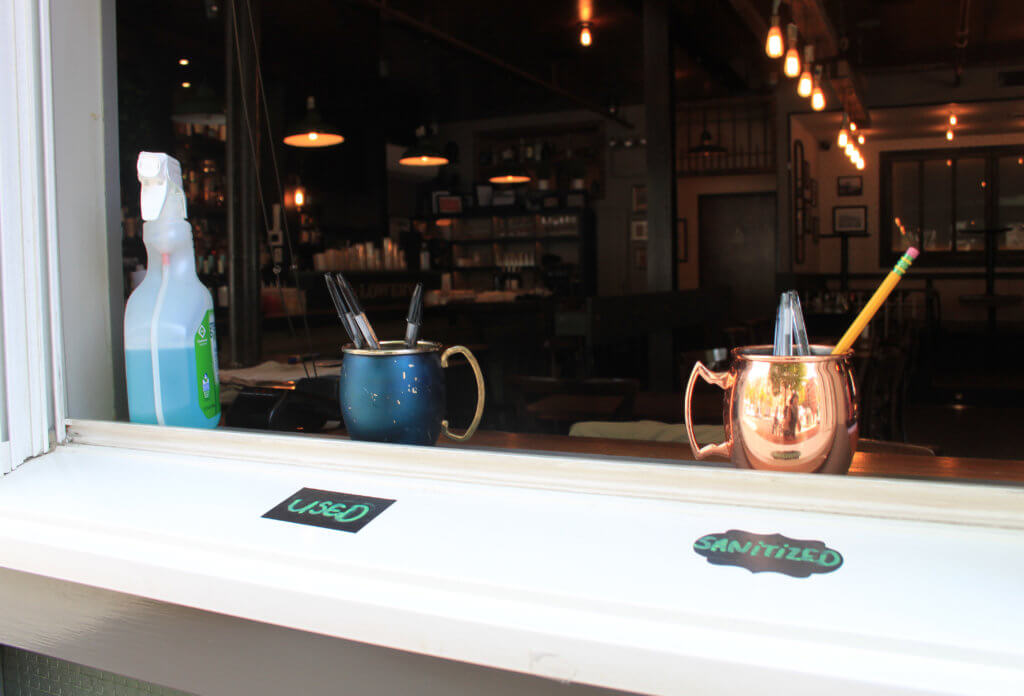
Loycent Gordon, the owner of Neir’s Tavern, decided to temporarily close the 191-year-old restaurant almost two months ago in order to keep his staff safe. To stay connected with Neir’s loyal patrons, Gordon has hosted several virtual happy hours. But he isn’t quite sure when they’ll reopen.
“It’s multi-faceted,” Gordon said, noting that one of his concerns is dealing with liability issues, like if a customer says they got sick at their restaurant.
The Center for Disease Control and Prevention has provided guidelines for restaurants to consider, delineating low- to high-risk establishments, promoting behaviors to reduce the spread of COVID-19 and maintaining healthy environments.
Where aid has come up short
Gordon managed to receive the federal government’s PPP loan, which can be forgiven if the business maintains their payroll. But he said it’s “good, but it’s also bad,” explaining that because most of his staff are on unemployment, they’re “just sitting on it.”
“If you use it, it becomes a loan,” he said, which will become another monthly expense.
Gordon added that 75 percent of the $90,000 grant Neir’s Tavern received from the de Blasio administration back in January when they helped them stay open, was taken back due to the budget crisis the pandemic has caused.
Even so, Gordon noted how some of the first recipients of the PPP loans went to national chains like Shake Shack. Although many other companies scrambled to return the loans by mid-May, the Trump administration has declined to name all the recipients of the loans, which has made business owners and elected officials concerned over whether most of the aid is going to big companies with access to other kinds of financing, according to Politico.
The city also created two small business COVID-19 relief programs, NYC Business Continuity Loan Fund and NYC Employee Retention Grant, managed by the Small Business Services department. But last month, the programs were criticized by Queens lawmakers Senator Jessica Ramos and Councilman Costa Constantinides for mostly catering to Manhattan-based businesses while small shops across Queens struggle to receive aid. Councilman Donovan Richards later introduced a bill aiming to address the disparity in the allocation of small business grants and loans.
Recently-appointed SBS Commissioner Jonnel Doris told QNS his main priority is to deepen their outreach to the four boroughs outside of Manhattan.
Irma Vargas, who runs Ricas Pupusas Y Mas at 47-55 47th St. in Woodside with her husband Daniel and two daughters, said they didn’t qualify for the federal government’s PPP loan. She said she’s applied to about seven different loans, but hasn’t gotten a single one.
“We haven’t qualified for anything, I don’t understand why,” Vargas said in Spanish.
Ricas Pupusas Y Mas has been open a little over a year. Instead of opening everyday like they used to, they decided to open from Thursday to Sunday, as sales have plummeted and the cost of food has increased.
But, Vargas said they were able to count on Queens Together to get some more business during the height of the pandemic. Queens Together was created by former Chef Jonathan Forgash and Sunnyside Shines Business Improvement District Director Jamie-Faye Bean to directly help local food businesses during the health and economic crisis while supporting frontline workers.
The group has organized numerous free meal deliveries for several Queens hospitals and other essential workers, and even established a food pantry in Long Island City for community members experiencing food insecurity. Queens Together does this by establishing a network of donors and sponsors that allow them to fund local restaurants, who in turn help feed the community.
Open Streets, and other proposed solutions
New pieces of legislation meant to provide COVID-19 relief for restaurants and bars — introduced by City Council and signed into law about two weeks ago by De Blasio — are now in effect.
The package of bills, hailed by restaurant and bar owners as “urgently needed, lifeline legislation,” addressed some of the industry’s major concerns, including imposing limits on third-party food delivery services, extending the suspension of sidewalk cafe fee collection, and protecting commercial tenants from harassment and personal liability.
Imposing limits on third-party delivery is a big step, as restaurateurs voiced their critiques of how delivery businesses cut into their profits with fees of up to 30 percent. Now, the new bills prohibit third-party delivery services from charging restaurants a fee for telephone orders that don’t result in a sale and capping fees greater than 15 percent per order for delivery and 5 percent per order for any other charge.
What’s more, some of the restaurateurs QNS spoke with said they’ve had issues that were out of their control, like food arriving to customers late because of other pick-ups or mishandling of their food.
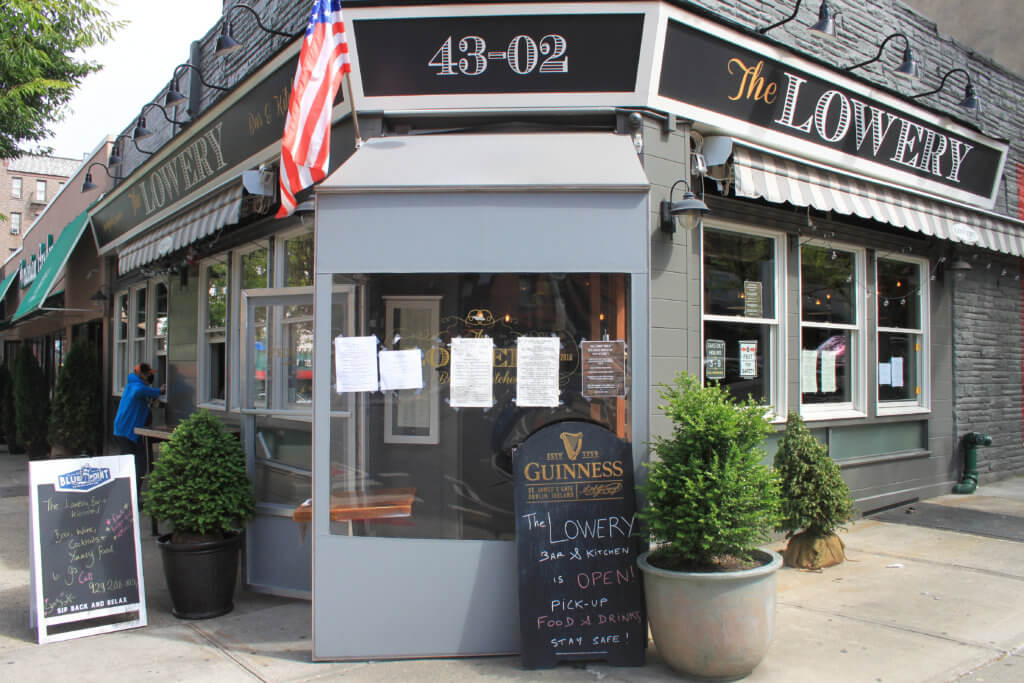
But the biggest idea set forth to help restaurants during the time of COVID-19 is to implement more Open Streets throughout the city, so eateries can have more space for customers to dine in (or out).
The Open Streets program is largely supported by restaurant owners, City Council, and community members.
The Old Astoria Neighborhood Association is advocating for more pedestrian-only streets to allow social distancing for cafes and restaurants.
“We will continue to advocate for our local economic health,” OANA wrote in one of their posts. “With everyone’s support, we can overcome obstacles that life has put before us. And we can all emerge stronger than ever!”
But O’Reilly, owner of Yerman’s Irish Pub, isn’t too keen on the idea, saying neighbors might complain about noise or crowding.
The city also announced plans for restaurants to establish outdoor seating, after Cuomo announced outdoor dining will now be bumped up to Phase 2. For New York City, Phase 2 might come as early as June 22, according to Eater.
The plans for Phase 2 include curbside seating without the need for application or approval process by allowing them to register and self-certify online. In the coming weeks and months, the city will also identify new Open Streets on commercial strips with a large number of restaurants and bars.
How long is too long?
New York City began Phase 1 of reopening on June 8, meaning “low risk” of infection businesses like construction, can start up again. But restaurants and bars, considered to have “high risk” of infection, won’t reopen until Phase 3. At least two weeks must pass between each phase, meaning it would still take until the first week of July for restaurants to reopen, according to a report from Eater.
Prior to Memorial Day weekend, de Blasio announced the city would increase police presence in nine “bar-heavy” restaurants, including Astoria and Long Island City, in order to enforce the city’s new campaign: “Take out, don’t hang out.” But this was put in place before the city released any guidelines for reopening, and could result in businesses facing fines or other enforcements, according to the New York Daily News.
So while the city and state begin to alleviate the stay-at-home order, there are still many factors restaurateurs never thought they had to consider — like keeping staff and customers safe from contracting a virus.
McSorley said fellow restaurateurs have told her they don’t know whether they’ll be able to open again if the lockdown persists or they have to comply with too many restrictions.
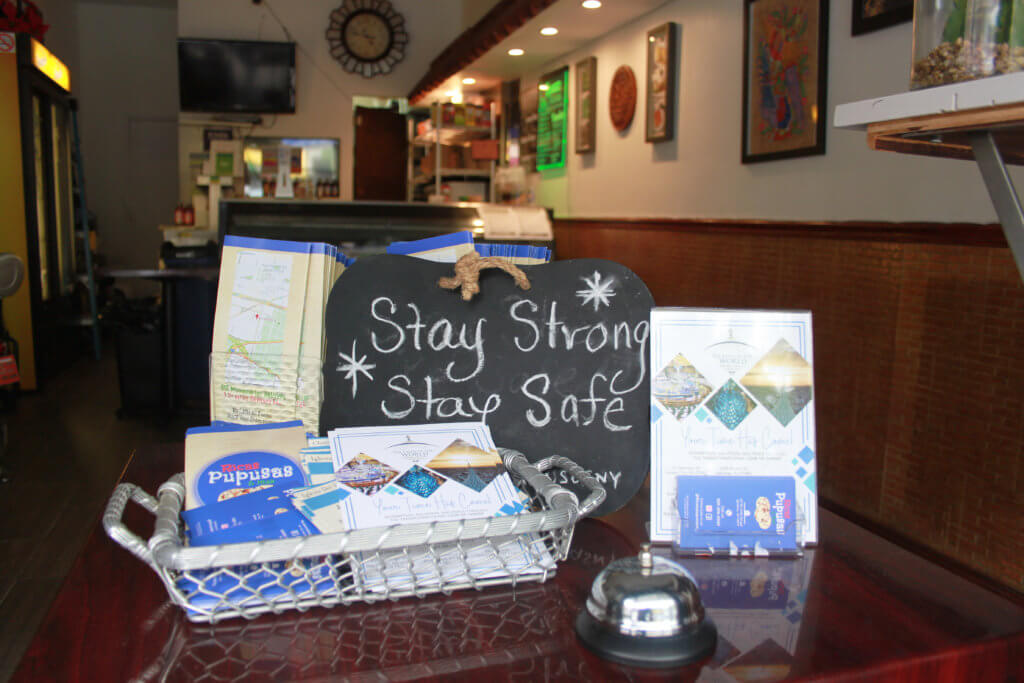
“I think politicians need to think about it, is Astoria going to start to look like a ghost town? Because some people will not open up again because they just won’t be able to manage with 30, 40 or 50 percent capacity.” she said.
O’Reilly wants to open soon, “before people get sick of not working.”
And for Vargas — who wants to see pupusas (delicious, stuffed and grilled tortillas) shine right next to the taco — stopping just isn’t an option.
“I don’t want to get sick, I think of my daughters and my family … so we take care of ourselves so that we can keep working,” Vargas said. “We have to keep fighting because there’s no other option.”
This story first appeared on qns.com.



